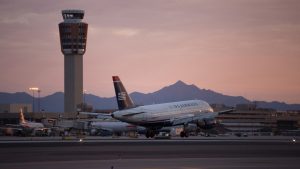- Slug: BC-CNS-Phoenix Tempe Lawsuit. 870 words.
- Photo available (thumbnail and caption below).
By Piper Hansen
Cronkite News
PHOENIX — The city of Phoenix is suing Tempe over the residential portion of a planned hockey arena entertainment district that Tempe residents will vote on in a May special election.
The complaint filed Tuesday in Maricopa County Superior Court by Phoenix, which operates Phoenix Sky Harbor International Airport, claims Tempe broke a contract when it advanced the plans for a residential development near the airport. The development is a $2.1 billion deal that will create the district if approved, but Tuesday’s lawsuit may halt or slow down the process.
In a statement, the airport said it is “asking the court to rescind Tempe’s recent zoning and land use changes and prohibit future residential uses in an area that the Federal Aviation Administration says is incompatible with residential development.”
Late last year, the Tempe City Council agreed to send three propositions to voters to create an entertainment district that would include nearly 2,000 apartments and a new 16,000-seat arena for the Arizona Coyotes. The entertainment district would include hotel rooms, restaurants and retail on more than 45 acres of city-owned land west of Tempe Town Lake on Priest Drive and Rio Salado Parkway.
The lawsuit claims Tempe’s approval of the development violated a 1994 agreement that limits how close residences can be to the airport, protecting communities from noise and the airport from litigation. The agreement does make exceptions for soundproofed apartments, which are part of the plan for the entertainment district.
“Tempe, for its part, promised to prevent new residences from being developed along much of this flight path and, more generally, on the Airport’s east side. Both measures have helped protect residents from aircraft noise, while also supporting the increasing demands for more flights for Arizona residents and visitors,” the lawsuit reads. “Despite these promises, Tempe now has done exactly what it promised not to do: approve, or start to approve, more residences near the Airport and in the area to which aircraft have been directed for decades.”
The Phoenix Aviation Department does “not object” to the proposed entertainment district or the sports arena, restaurants and shops, Phoenix Director of Aviation Services Chad Makovsky said in a statement.
“Today’s action is about ensuing Tempe lives up to its commitments to protecting our state’s largest economic engine — Phoenix Sky Harbor International Airport, the more than 57,000 employees and 44 million annual travelers who depend on the Airport, and the communities surrounding the Airport who depend on the long-standing agreement between our two cities,” Makovsky’s statement said.
The pro-development group Tempe Wins, sponsored by Bluebird Development, countered with its own statement that noted there is no shortage of new residential development in downtown Phoenix near sports venues or around the airport.
“While it is OK for Phoenix to build a baseball stadium, a basketball arena, and a soccer stadium in the flight path of Sky Harbor Airport, somehow it’s wrong when Tempe attempts to convert an old polluting landfill into a new sports and entertainment district,” a statement from the group said.
Tempe 1st, the grassroots group opposed to the entertainment district, said in a statement the lawsuit is “just the latest reason Tempe voters should reject Propositions 301, 302 and 303,” because of the project’s “irresponsible impact” and Tempe residents’ desire for a better deal “that is aligned with health, safety and Tempe’s values.”
Proposition 301 would amend the city’s General Plan 2024 Land Use Map to facilitate the redevelopment of city-owned but commercially zoned property into a mixed-use project that would include the Coyotes franchise and entertainment district used for retail, restaurant, hotel, office and residential land purposes.
Proposition 302 would rezone the city property, and Proposition 303 would uphold Tempe’s decision to authorize Mayor Corey Woods to sign off on a development and disposition agreement with Coyotes and Bluebird Development owner Alex Meruelo.
Former Tempe Councilmember Lauren Kuby, who is a prominent voice in the Tempe 1st campaign against the entertainment district, said the lawsuit and continued back-and-forth on social media between groups has had a “divisive effect” on the community.
“We’re a community before, during and after,” said Kuby, a former senior global futures scientist at Arizona State University’s Julie Ann Wrigley Global Futures Laboratory. Kuby, who made an unsuccessful bid last year for a seat on the Arizona Corporation Commission, has said the development is “ill-advised” on its environmental impacts, that it ignores plans to conserve water and is misinformed about soil preparation and remediation.
Kuby said the lawsuit is an indication the project might not be in the right place or with the right partners. The perfect idea for a replacement or something to go on the landfill might not be out there, she said, but she added a project with community input that has a much quicker return on investment with clearly written agreements is preferred.
In 2022, when the proposal to develop the entertainment district was in its early stages, Phoenix had objected to the residential part because of the proximity to the airport. Its objections ended just before Tempe decided to send the propositions to voters.
Makovsky told the Arizona Republic there was a last-minute inclusion of an “indemnification” clause in the Coyotes’ proposal. The promise required the Coyotes to defend the airport in court against noise-related lawsuits filed by new residents living in the district.
“After more than a year of meetings and negotiations, we are disappointed that these efforts did not resolve the dispute,” Makovsky said in a statement. “…we felt we were very close to a reasonable resolution. We are now left with no other option than to put this in the hands of a judge to confirm the obligations Tempe agreed to in 1994.”
Ballots for the May 16 special election will be mailed to Tempe voters starting April 19.
